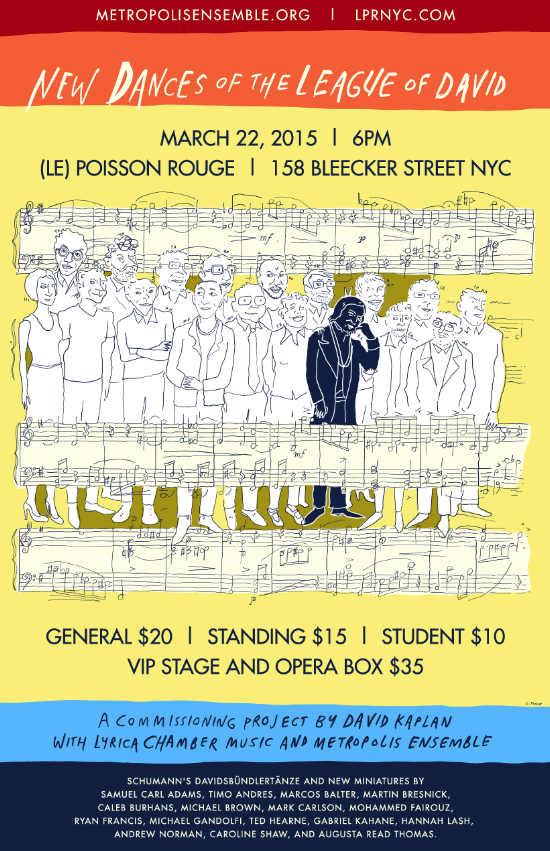Metropolis Ensemble returns to LPR on March 22nd for the NY premiere of New Dances of the League of David. We asked pianist David Kaplan to share his thoughts on the upcoming event, check it out below:
“The concert on Sunday the 22nd may be a piano recital, but musically speaking, it has far more to do with a cocktail party.
Sixteen extraordinary composers are the guests of honor in the home of Robert Schumann. Except for the loquacious and beloved host, nobody holds the floor longer than etiquette allows, but each dazzles with a unique voice and personality. As a listener, you mill about the room, and somehow manage to speak with everyone. And because you are at LPR, the cocktail party isn’t merely an analogy. By all means have an actual drink.
New Dances of the League of David weaves newly commissioned miniatures by leading American composers into Schumann’s Davidsbündlertänze, a set of short interconnected character pieces which the composer dedicated to his fiancé, the dynamite pianist Clara Wieck.
Preparing to play this program means getting comfortable with musical whiplash. Practicing sixteen short works is already a whirlwind– but when those composers converse in Schumannese, flux is the new stasis. Non sequitur is the new ergo. Because, after all, Schumann’s music on its own operates with musical multiple personality disorder. Each new work is a unique statement of style, beauty, and wit—yet they are unified by their engagement with Schumann’s spirit. They indulge in rapid shifts of character, multilayered rhythmic texture, and poignant eloquence.
For me, this commissioning project has meant the chance to merge my passion for Schumann’s music with my keen interest in performing the music of today, and to contextualize one with the other. While most programs are driven by a piece of music, in this case, a piece of music is driven by programming.
The variety of approaches taken by the composers is astonishing– all the more because each composer focused on a different movement from the Schumann.
Some, such as Mark Carlson, Gabriel Kahane and Timo Andres, chose to alternate original music with that of Schumann phrase by phrase, bar by bar, totally reimagining Schumann’s language.
Ted Hearne asks for percussive sounds created by damping strings—distilling the dance element of the original Schumann into its essence. Hannah Lash, in a piece that sounds as if it has no barlines, does the very opposite—distilling the atmospheric element instead.
Martin Bresnick creates a multi-century mashup that pays homage to Ligeti’s Autumn in Warsaw as well as the Davidsbündler, creating a ferocious emotional commentary punctured by passages of eerily disquieting quietude.
A few re-harmonized or reset Schumann’s melodies (Caleb Burhans, Marcos Balter), while others excavated tiny fragments for further development (Augusta Read Thomas, Michael Brown, Caroline Shaw). Andrew Norman adapts one motive into a languid upbeat that accelerates into one of the more swinging Schumann numbers.
Samuel Carl Adams tracked the harmonic structure of a Schumann movement, while obscuring it in his own distinctive idiom of rhythmic ambiguity and ecstatic beauty. Similarly, Ryan Francis borrowed the tone and texture of one lyrical movement, but took the melody in a direction all his own.
Michael Gandolfi took a kaleidoscopic approach, playing with reflection, refraction, and time-warp, so that even as he uses the same notes as one Schumann movement, the original is barely recognizable. Mohammed Fairouz wrote an exciting dance that evokes the reckless abandon of Schumann’s Florestan.”
Join us on Sunday, March 22nd for Metropolis Ensemble presents: New Dances of the League of David, details here

posted by M.B.D.

